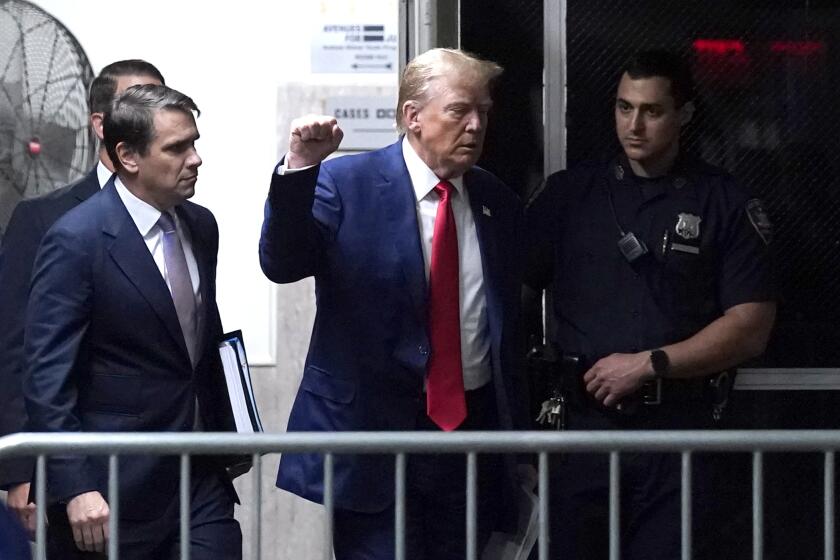COLUMN RIGHT : There’s Not a Nickel’s Worth of Difference : More and more, the Republicans and Democrats resemble a one-party system.
The Libertarian Party is holding its presidential nominating convention in Chicago this week, and for the first time it will receive live television coverage (on C-SPAN).
It’s good to know that there is something different going on in American politics, and maybe the rest of us should pay attention, because the Republicans and the Democrats more and more resemble a one-party system.
It’s instructive to note why the Libertarians are meeting about a year ahead of the others, incidentally. In the 50 states, the two major parties collude with one another to restrict access to the ballot, making it difficult for other political parties to be listed without time-consuming and costly petition drives.
If two dominant corporations were to restrict competitors’ access to the market in this way, they would certainly be charged with antitrust violations. But no one complains when the amalgamated Democrats and Republicans do it, and the press seems to look the other way, as well.
Meanwhile, as Alabama’s George Wallace said, there isn’t a dime’s worth of difference between the major parties. Since he said that, in the late 1960s, the differences that once existed have almost certainly diminished. It’s not surprising that the Democrats are finding it difficult to muster presidential candidates for next year’s race. The latest dropout is Sen. Albert Gore Jr. of Tennessee. What are the political and philosophical differences between him and Bush? They are difficult to discern, to put it mildly. In declining to run, Gore mentioned family reasons, but it’s also possible that he saw no reason in principle to oppose the President.
The main business of the federal government is spending about $1.4 trillion of taxpayers’ money. But last fall, the one-party system in Washington coalesced as never before, with a budget “deal,” the terms of which seem to have precluded any further discussion of this vast redistribution of income, and even to have preempted the possibility of tax cuts.
Who struck this deal? It was one more of those “bipartisan coalitions.” There was a photo opportunity in the Rose Garden, with George Bush and his pal, Rep. Dan Rostenkowski of the House Ways and Means Committee, House Speaker Tom Foley, Budget Director Dick Darman, and a dozen others, all standing shoulder-to-shoulder, as self-congratulatory as could be because they had agreed to spend more of our money for us once again. The Washington of George Wallace’s day was acrimonious by comparison. Democracies traditionally do have coalition governments in wartime, but, the last time I checked, the country was at peace.
Wherever you look, there isn’t a nickel’s worth of difference. Take defense spending. The United States now has any number of allies, but (with the evident collapse of Soviet will) no discernible enemies worth the name. The Republicans would like to see a slow reduction of defense spending; but the Democrats in practice turn out to be no different. Liberals welcome defense dollars in their own districts because they mean jobs.
Civil rights? The Democrats want a quota bill, as Bush correctly pointed out earlier this year. His response was to urge the passage of a quota bill--in reality if not in name. Only trained lawyers can fathom the difference between his civil-rights bill and the Democrats’ version.
And so it goes, wherever you look. “Moderate Republicans” and “moderate Democrats” have linked arms--and achieved a stranglehold on the country and on our checkbooks. They spend more of our money than ever, and we’re supposed to be grateful because the “extremists” have been shunted aside.
Why do we have to put up with this? The tendency in the world is toward the decentralization of power. The Russian people in particular have shown us in recent days that the oppressive power of central government can be faced down. Something analogous to the Russian revolt is long overdue. Like the Soviet republics, our states should summon the will to reassert the power that was granted to them by the Constitution but has been slowly usurped by the federal government.
The problem is that the American system has become seriously corrupted by the redistribution of tax dollars. So many people are now on the take--whether defense contractors, or welfare recipients or senior citizens--that there is a large and apparently permanent constituency for maintaining the status quo.
It doesn’t have to be permanent, as Moscow and Leningrad have shown us. But Americans must first bestir themselves from their somnolence. Tune in to the Libertarians this week. These are some of the issues they will be discussing.
Only if enough of us register our displeasure with the current system, can it be changed.
More to Read
Get the L.A. Times Politics newsletter
Deeply reported insights into legislation, politics and policy from Sacramento, Washington and beyond. In your inbox three times per week.
You may occasionally receive promotional content from the Los Angeles Times.






